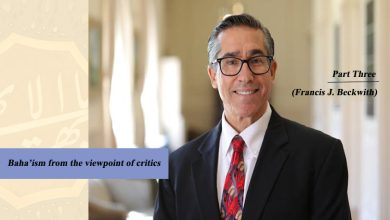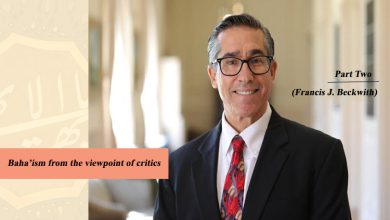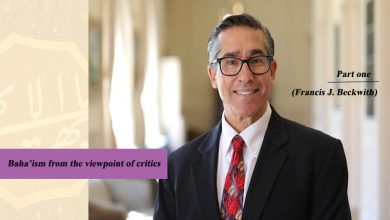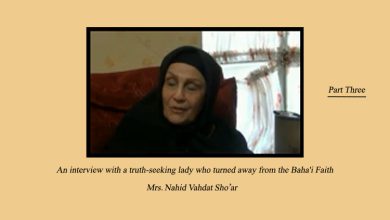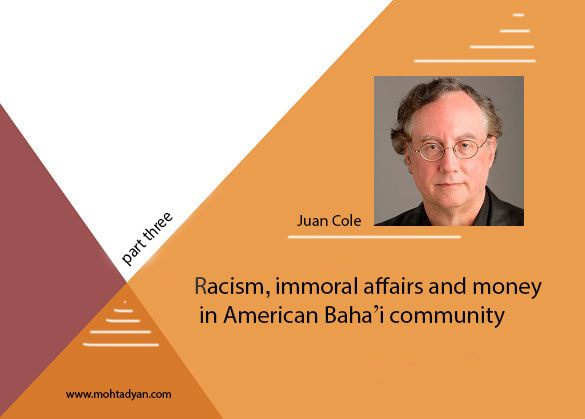
Juan Cole is one of the world’s most well-known researchers in the subject of Baha’ism. He himself was a Baha’i and has made great services to Baha’ism. He was separated from Baha’ism following extensive research and has written critical articles one of which you can read below: According to Wikipedia, John Ricardo I. “Juan Cole” (born on 23rd of October 1952) is an American contemporary scholar and historian in the area of Middle East and South Asia. At present, he is the “Richard P. Mitchell” Professor of History at the University of Michigan. Cole has written several books on modern Middle East and translates some Arabic and Persian texts into English. He who was from a Christian family, following the dispute with the Baha’i establishment, separated from the cult. He runs a weblog called Informed Comments on the address “juancole.com” which is also released in truthdig.com simultaneously.
This article reviews and analyzes the dissolution of the Assembly of Baha’is in Los Angeles by the America National assembly in the years 1986-1988. Official explanation in this regard emphasizes on the decline of moral affairs as well as the weakness of administrative discipline; but local interviews as well as some official statements consider the roots of differences in two things: 1- Globalization of the Cause Community and the resulting racial conflict between whites and African- American blacks and Iranian immigrants after the Iranian revolution. 2- National and local disputes over power and money.
The U.S. National Assembly appears to have been worried that the large influx of Iranian Baha’is would create a new voting bloc and throw up candidates for national election, displacing current members. In response, the National Assembly acted behind the scenes to close down regular scripture study sessions hosted by popular Iranian immigrant lay preachers, who were becoming prominent and therefore had a chance of being elected to the National Spiritual Assembly. These actions were so successful that from 1978 when the influx of some 12,000 Iranian Baha’is began, till the eve of the twenty-first century, no Iranian Baha’i immigrant from the wave of the 1970s and 1980s was ever elected to the National Assembly. That many Iranian Baha’is felt unwelcome was therefore not only the result of local Los Angeles actions.
With regard to the issue of immorality, what Henderson did not say was that many of those implicated in immorality were wealthy Iranian businessmen who brought with them the norms of behavior of the Pahlavi elite in Tehran under the shah. In such cases, such behaviors reflect the collective identity of minorities. “There have been reports of alcohol consumption and opioid use,” says Mrs. Manila Lee. The assembly did not pay much attention to them. Of course, some American Baha’is also violated Baha’i law, but most of the reports concerned Iranian Baha’is. The African-American population of Los Angeles was also undergoing enormous changes 1970-1990, during which the black population grew from about 744,000 to 927,000. The city witnessed among the greatest rates of residential desegregation in the country during this period, with the dissimilarity index dropping from .90 in 1970 to .73 in 1990. African-Americans became substantially more educated, and even though their earnings continued to trail those of whites and Latinos, they made the most economic improvement in this period. Mayor Tom Bradley served as a symbol for this advance.
The black Baha’is tended to belong to the upwardly mobile middle class that was making such strides in this period. Although there were problems with African- American Baha’i participation, it is not clear that these were greater than the fall-off in white attendance and giving. The new Baha’i center was a refurbished bowling alley on the edge of a middle class African-American neighborhood, after all. In her Dialogue interview, Manila Lee traced the alienation of some African- American Baha’i’s to early 1984, when the new Baha’i center opened, a new staff was hired to run it, and committees were reshuffled. The new staff was all-white, and African- Americans felt they had been excluded from responsible positions, especially from the financial management committee, and it had been alleged to Lee by one African-American that the whites had said blacks don’t know anything about financing
She said that the blacks are a minority in the United States and very sensitive to people’s leadership if they feel there is any basic racism, and that the number of African- American s who attended feast began dwindling, and those who had been active members gradually became inactive. Other African- American s living in Los Angeles at that time also remarked that they perceived the Iranian immigrants to have brought with them prejudices against blacks, and that some of the alienation stemmed from the new mix of ethnicities in the community. Interestingly, this dynamic among non-whites was not mentioned by Henderson as a problem. In addition, some of the 300 black Baha’i from Los Angeles allege that Henderson exaggerated their disaffection at that point, saying that they participated faithfully in the Gospel choir, the Sunday services at the Baha’i center, and as members on the local assembly.
The attempt of the National Assembly to intervene in local Los Angeles affairs ultimately failed. At the Southern California district convention in October, 1986, the attendees passed a resolution with overwhelming support asking the National Assembly to dissolve the Administrative Committee and permit new elections for a Local Spiritual Assembly of Los Angeles. Members of the committee who were present at the convention asked that the convention’s request be sent to the Administrative Committee itself rather than to the national assembly, but this suggestion was voted down. One interviewee recalls, a lot of people there felt that something was wrong about having an appointed committee running the community, regardless of the fact that the National Assembly has appointed it and the Universal House of Justice had approved it. Even when Universal House of Justice Member Glenford Mitchell visited Los Angeles in this period, he was testily asked when the community would get its assembly back. The interviewee remembered, He was kind of flustered by the question and followed the party line that it was up to the local community, that if they met some (unstated) standard, the Assembly would be restored. Baha’i scriptures recommend parliamentary governance, and U.S. Baha’i’s see power exercised by unelected individuals as illegitimate.
By March 19, 1988, the National Assembly had become convinced of the failure of their highly interventionist experiment, and seven members of its members were flown to Los Angeles for a meeting at the Baha’i center to announce that annual elections for the Local Spiritual Assembly would be resumed that April. Only about 200 of the community’s some 1200 adult members attended the meeting, which seems likely to have been meant as a sign of local disgruntlement. The auditor of the National Assembly took out the accounts. He said only about 200 people donated and without the rental income, the Los Angeles community would run an annual deficit of between 70,000 and 100,000 dollars.
It should be said that we don’t know about the process of building a Baha’i community in a metropolitan environment. James Nelson, the municipal court judge, promised that an advisory council appointed by the National Assembly would work with the newly elected Local Spiritual Assembly. He emphasized the spiritual and moral challenges.
It is clear that Kazemzadeh had a rather different reading of the problems than did Nelson or Henderson. Though he did not use these terms, he saw them as rooted in a lack of what Marxists would call party discipline. Kazemzadeh clearly has a firm vision of the Baha’i institutions as a sort of elective dictatorship, unchallengeable, beyond public criticism, and to be unhesitatingly obeyed. Nor is it to be responsive to community concerns, which would be a capitulation to public opinion. More worrisome, he wanted to see this system become the civil government.
Although Henderson and other members of the National Assembly fore-grounded, in their explanations for why the local assembly was dissolved, issues in immorality and race relations, I believe that these considerations were subsidiary to power and money. Although immoral behavior is considered very serious in the Baha’i community, it would not normally impel the dissolution of a local assembly unless the assembly members themselves were persistently guilty of it, something not charged in Los Angeles. As for race relations, there is no reason to think these were substantially worse in Los Angeles than in other big urban Baha’i communities of that period, and there are enough inconsistencies in Henderson’s story of Iranian refugees rebuffed and a vastly diminished African- American presence to raise serious questions as to whether these alleged situations even existed, much less forming causes for dissolving a local spiritual assembly. Other eyewitnesses appear to have perceived the situation very differently, with the Los Angeles local assembly exceedingly accommodating of Iranian escapees, welcoming them into the community and refusing to punish their peccadilloes, with continued substantial black presence despite some hurt feelings provoked by both white and Iranian insensitivity, and with the major change being dramatically decreased white participation in many community affairs as a result of frustration over issues such as culture shock at the influx of Iranians. But other communities, such as Santa Monica, suffered from much worse declines in non-Iranian participation than did Los Angeles. The issue of disunity on the local assembly was more serious, insofar as it threatened to undermine what Baha’i administrators often privately refer to as party discipline.
Henderson’s own ambitions must be taken into account, as well. He had become secretary general of the national assembly 1984, after his company went under in Atlanta. The position of secretary has tended to be held for life or until election to the Universal House of Justice. In the hardline Baha’i political culture of the top administrators, success required him to demonstrate an ability to impose his will on the national community. Money was probably even more important than power. Henderson’s various remarks on the economic situation contain strong clues as to the National Assembly’s most pressing motivation in seeking to resolve the community’s leadership problems. Local contributors to the Baha’i fund had slipped to only 125 out of 1200 adults as a result of lack of trust in the local assembly’s leadership, which reduced the National Assembly’s receipts from the Los Angeles (American) community to almost nothing. The poor management of the clinic’s office space, resulting in missed rent payments worth several thousands of dollars a month, and ultimately a lawsuit that had to be settled by the National Assembly for 100,000 dollars, was even more serious than the decline in giving. It threatened the ability of the local community to continue to staff the new Baha’i center and perhaps even raised the specter of requiring substantial contributions from the National Assembly to keep it open. The mismanagement of the local assembly by spring of 1986 seemed very possibly poised to cost the National Assembly tens of thousands of dollars if it were allowed to continue. Henderson draws a full-time salary and perquisites, including free rent and upkeep at the nine-bedroom mansion that also serves as the secretary’s administrative headquarters, and some have estimated his package, in cash, kind and perquisites, as worth over 150,000 dollars a year. The National Assembly was perpetually in need of money, and was usually in debt, often avoiding substantial indebtedness only because of bequests. Individual members of the National Assembly depended on the national fund. To have a major urban Baha’i community like Los Angeles, full of wealthy business people and professionals, become a substantial drain on national finances rather than a major profit center, threatening national finances, clearly could not be allowed. Of course, it is not clear how much money was transferred to the National Assembly account in 1986-88 after the dissolution of the local assembly and the appointment of the executive committee.
Nor could the problem have been solved locally. Current rules make it impossible for a local community to exercise effective oversight over its assembly, which members are not allowed to criticize publicly, and to which unswerving obedience is inculcated. One particularly active feast was aware of the problems in LA, and even drew up a plan to resolve them, but the local assembly declined to implement it, and there was nothing those 200 more informed believers could do about it. The major obstacle to dealing with these sorts of problems by a large, urban Baha’i community such as Los Angeles is the electoral system. The extremely low-information elections, the manner in which nine persons each with only a handful of votes can be elected if their tallies are higher than all the others, the tendency of the system to perpetuate incumbency in larger communities, the lack of reporting requirements on the precise use of funds in the budget or other means of judging the performance of the incumbents all of these features of the system militate against local electorates finding solutions for dysfunctional local assemblies. The alternative, of having the National Assembly intervene from above to fire Local Assembly members at will, has the severe disadvantage of lacking in legitimacy in the eyes of rank and file Baha’i’s. These problems, however, cannot be addressed in a thoroughgoing manner in the terms of contemporary Baha’i discourse, which is why the planned Dialogue magazine article on the dissolution was never allowed to appear. No trace of the events I have discussed remains outside the memories of the participants, and that there might be systemic problems was disallowed by all the officials involved, who chose instead to speak of lapses in personal morality. Norman Klein called his book on Los Angeles “The History of Forgetting”. If he is right, Baha’is are perfect Angelenos.


